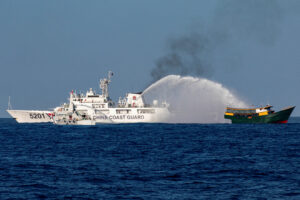House think tank seeks oversight over PHL Armed Forces defense spending
PHILIPPINE lawmakers should allot enough defense budget and legislate reforms within security agencies to advance the military’s modernization program amid worsening tensions with China, according to a congressional think-tank.

By Kenneth Christiane L. Basilio, Reporter
PHILIPPINE lawmakers should allot enough defense budget and legislate reforms within security agencies to advance the military’s modernization program amid worsening tensions with China, according to a congressional think-tank.
Lawmakers should also exercise their oversight powers over the Armed Forces of the Philippines’ (AFP) upgrades by checking if their planned purchases are in line with the country’s “strategic needs” to prevent wasteful spending, the Congressional Policy and Budget Research Department (CPBRD) said in a February paper.
“Increasing funding is not enough to ensure the success of the AFP’s modernization program,” CPBRD authors Byron M. Bicencio, Arsenia S. Gonzales, Prince Louie B. Mamhot and Noel H. Sempio said in the 23-page discussion paper.
“What are simultaneously necessary are the pursuit and enactment of internal reforms by the AFP to be… responsive to the challenges of the times and to ensure that they spend on and acquire the right equipment,” they added.
Manila and Beijing have been at loggerheads over disputed features in the South China Sea, which Beijing claims almost in its entirety. A United Nations-backed tribunal based in The Hague in 2016 voided China’s claim for being illegal.
The Philippines is at the tail-end of its military modernization program called “Horizon,” which began in 2012 when tensions with China flared after a naval stand-off at Scarborough Shoal in the South China Sea. Manila has earmarked about $35 billion for military upgrades in the next decade.
The Philippine government has incurred a P2.1-trillion funding shortfall for the modernization effort as of August 2024, according to the House of Representatives think-tank. About P348 billion has been spent on military hardware upgrades since 2002, it added.
“It is imperative that the AFP modernization program receive adequate funding to enable the AFP to acquire the necessary capabilities to defend the country from both internal and external threats,” it said.
But lawmakers should ensure that public funds are “spent wisely” on military hardware, the think-tank added, urging them not to take proposed upgrades at face value.
“It must be ensured that vital budgetary resources are spent wisely on the right arms, equipment and hardware in the first place,” the think tank said. “The AFP’s modernization should not be hinged on a mere ‘wish list of equipment,’ but on a proper decision-making process… that would identify their strategic needs.”
“Reforms of the defense establishment must lean towards effective communications between high military staff command and political leaders across the board,” Joshua Bernard B. Espeña, an international relations lecturer at the Polytechnic University of the Philippines, said in a Facebook Messenger chat.
“Congress must review how each section of the bureaucracy delivers its mandate with efficiency and coordination, especially in safeguarding against corruption and red tape on spending concerns such as acquisitions, logistical management, intelligence operations, training and international engagements,” he added.
“This is crucial given how defense missions require a delicate balance between swiftness and caution in the avenue of decision-making.”
AFP Chief of Staff Romeo S. Brawner, Jr. last week said the military is eyeing additional BrahMos anti-ship missiles from India and at least two submarines.
Congress should also amend the 1935 National Defense Act, which laid the foundation for the Philippines’ military structure and defense policies, the CPBRD said.
“Faced with a maritime issue, the Philippines would have to move from being essentially ‘army-centric’ and urgently improve the capabilities of both its navy and air force in order to defend its seas,” it added.
There’s also a need to craft a law that would harmonize and streamline the Defense department’s policymaking authority for a more coordinated defense posture, the CPBRD said.
“New defense policies, principles and concepts have also been introduced and adopted over the years… substantially changing the structure, powers and functions, operations, and accountability of the various defense institutions,” it added.
The think-tank also said the government should spur the development of domestic defense industries by supporting them under a law mandating a self-reliant defense posture.
“This may entail the establishment of special defense economic zones and the further development of the shipbuilding industry, key measures which may be pursued by Congress,” it added.











